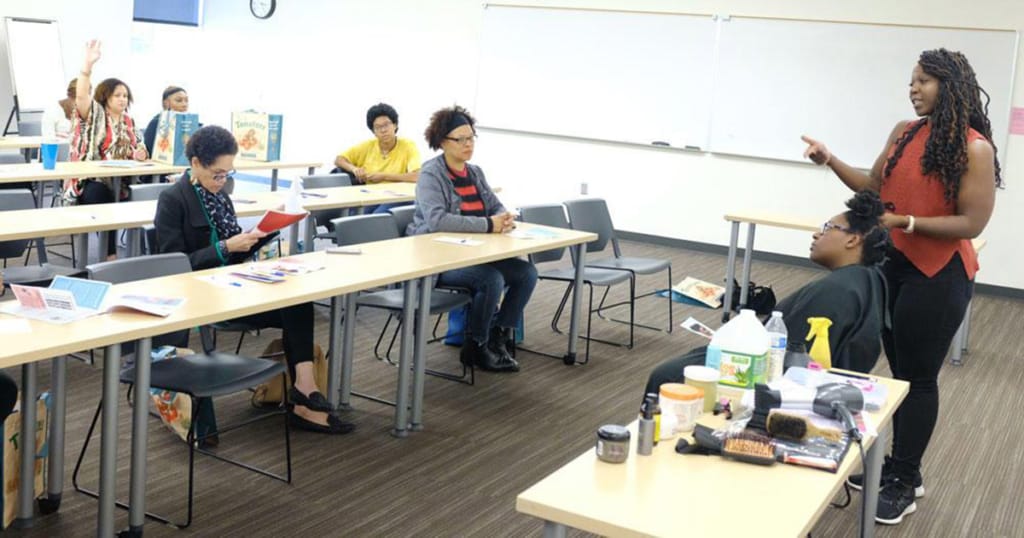
By Chris Branam
Growing up in southwest Portland, Tholanda Newborne was usually the only Black student in her class.
She was in elementary school when she got her first perm to straighten her hair.
“School was a place where I wanted to adapt. I wanted to fit in,” Tholanda says. “I didn’t feel that I could walk in with a big Afro. I had my hair straightened all the way through my early 30s.”
In 2016, Tholanda joined a pilot project called My Hair My Health PDX!, in which a group of African American women got together in Portland-area Black salons and discussed ways to incorporate healthy eating and physical activity into their lives.
That event, co-organized by the Oregon State University Extension Service, grew into an in-person conference in 2017.
Tholanda’s view of her hair, and her health, changed.
“I really started to connect with people who have the vision that it’s OK for me to want an Afro, that it’s OK for me to want braids,” she says. “They were the group of women that got me comfortable with going natural. I just got my hair braided a few days ago and it feels great.”
On Saturday, My Hair My Health PDX! returns for its fourth year. Due to COVID-19 restrictions on public gatherings, the event will be presented virtually. Registration is free.
My Hair My Health PDX! is an award-winning, culturally tailored health promotion event that encourages Black women to celebrate their beauty from the inside out.
The conference uses hair topics as a platform to promote healthy eating and active living, says Adejoke Babatunde, OSU Extension’s SNAP-Ed outreach coordinator for the Portland Metro area. She co-founded the event with Joyce Senior Angulo, Extension SNAP-Ed coordinator in Clatsop County, and others. The SNAP-Ed program is a part of the Extension Family and Community Health program, housed in OSU’s College of Public Health and Human Sciences.
“As Black women, many of us prioritize taking care of our families, friends, communities and careers, which means less time taking care of our bodies and our overall health,” Adejoke says.
Hair care as a barrier to exercise
Research suggests that hair care concerns may keep some African American women from exercising routinely. About a third of participants in a recent research study said that hair concerns prevented them from exercising as often as they would like, and women who work out less frequently because of their hair were less likely to meet recommendations for weekly physical activity.
African American women are the least active demographic group in the United States, with only 36% meeting national physical activity recommendations – and about four out of five Black women are overweight or obese, according to the Centers for Disease Control and Prevention.
The low physical activity levels and disparate chronic disease burden among African American women highlights the need for innovative healthy eating and physical activity interventions addressing hair care issues, according to Joyce and Adejoke.
Oregon’s African American population experiences substantial health disparities for health outcomes such as diabetes, stroke, and low birth weight, and in access to health insurance, prenatal care, and mental health care, Joyce and Adejoke say.
“The intent of My Hair My Health PDX! is to address the issue of hair as a potential barrier of being physically active and provide resources to help them achieve healthier lifestyles,” they say.

My Hair My Health PDX! aims to empower participants by offering tools and resources to:
- Promote healthy behaviors, such as increased fruit and vegetable consumption and regular physical activity;
- Boost knowledge and skills to overcome barriers to healthy behaviors;
- Improve self-image and self-acceptance; and
- Heal body, mind and soul.
“Along the way, we have other topics that rise to the surface that relate to social justice, mental health, spirituality, self-care and self-love,” says Joyce, statewide coordinator for the Expanded Food and Nutrition Education Program.
Uplifting and empowering
My Hair My Health started as a pilot intervention in 2012 in San Bernardino County, California. It served as a way to gain entrance and build partnerships in the African American community while providing much-needed health resources.
While only 2.2% of Oregon’s population identifies as Black or African American alone, more than 80% of the state’s African American population lives in the Portland metro area.
“Our goal was to take this model and adapt it to the specific context of the Black community in Portland,” Joyce and Adejoke say.
In the summer of 2016, the My Hair My Health PDX! planning committee formed, consisting of representatives from OSU Extension, the Oregon Department of Education and the Oregon Health Authority.
The first three conferences in Portland drew a total of 400 participants, featured more than 30 general and breakout sessions, included 72 panelists and speakers, and showcased 35 Portland-area vendors.
In 2018, My Hair My Health PDX! received three Mary W. Wells Memorial Diversity awards from the National Extension Association of Family and Consumer Sciences: first place in Oregon, first in the western region, and second in the nation.
“The energy at the event is electrifying,” Joyce and Adejoke say. “As a Black community we get so little opportunities to come together and just celebrate us. It’s a very powerful thing and in these current times we need to continue to find ways to uplift and empower our community.”
Tholanda agrees.
“The environment is really inspiring and uplifting and encouraging, and it feels authentic,” she says. “That is the beauty of what they’ve put together.”
This story originally appeared on the OSU Extension Service website.